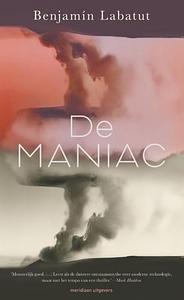Take a photo of a barcode or cover
challenging
medium-paced
Plot or Character Driven:
Character
Strong character development:
Yes
Loveable characters:
Complicated
Diverse cast of characters:
Complicated
Flaws of characters a main focus:
Yes
DNF at 55%. Initially I was pretty stoked on the "what if Bolaño wrote Oppenheimer" conceit, but as it went on I became increasingly convinced that Labatut didn't quite have the juice to pull off his attempted polyphony of narrators. They all eventually sounded like they had the same voice, a voice I came to find pretty tiresome, a drone without end amen. Another example for my ever-growing thesis that Most Novels Should Be Under 200 Pages Or Over 500 Pages.
adventurous
challenging
mysterious
reflective
medium-paced
Plot or Character Driven:
Character
Strong character development:
Yes
Loveable characters:
Yes
Diverse cast of characters:
Yes
Flaws of characters a main focus:
Yes
Benjamin Labatut’s The Maniac is a fascinating exploration of the blurry line between genius and madness, history and fiction. This novel presents a rich tapestry of characters, events, and ideas that delve into the profound impact of scientific and mathematical discoveries on our understanding of the world—and ourselves.
Labatut masterfully blends real historical figures like John von Neumann with imaginative storytelling, creating a compelling narrative that feels simultaneously grounded in reality and eerily surreal. As he writes, “The human mind, once stretched by a new idea, never returns to its original dimensions.” This sentiment captures the novel’s essence: a meditation on how groundbreaking ideas reshape humanity’s course and its collective psyche.
The book’s prose is sharp and evocative. Labatut’s descriptions of von Neumann’s life and his contributions to quantum mechanics, game theory, and computing are interspersed with existential musings. These reflections make the book more than just a recounting of history; it becomes a philosophical inquiry into the consequences of knowledge.
What makes The Maniac stand out is how it blurs the boundaries between fact and fiction. Labatut takes historical truths and infuses them with speculative elements, forcing readers to question what is real. This approach mirrors the uncertain nature of the scientific discoveries the book discusses.
For example, Labatut writes about the creation of the hydrogen bomb with chilling precision, yet the emotional weight of the scenes comes from his fictionalized portrayal of its creators grappling with their invention’s destructive power.
While its intricate themes might be overwhelming for casual readers, the novel is a rewarding journey for those willing to ponder the profound intersections of science, morality, and human ambition.
Labatut’s The Maniac is both a cerebral and haunting read—a work of fiction that feels unsettlingly close to reality.
I loved Labatut’s previous book When We Cease to Understand the World so I was excited to read this one. Like When We Cease to Understand the World, Maniac was thought provoking and engaging but i found the writing and structure less effective. The exploration of randomness and logic was beautifully done—I love the way that theme in particular emerges in the context of AI in the final section. I found the middle section lacking unfortunately. Like his previous book, the mix of narrative style and unique structure added to the plot and thematic exploration, but not as much as in When We Cease to Understand the World. Still a very enjoyable read and I am excited to see what he does next.
This book was interesting in that I didn’t really know much about Von Neumann prior to reading it and it is truly impressive how many areas of science and technology he influenced in his time. I wasn’t a huge fan of the fictionalized accounts of the people around him as a story telling device. To each their own though
challenging
dark
slow-paced
Plot or Character Driven:
A mix
As in “When We Cease to Understand the World”, Labatut navigates the fine line between genius and madness. And how following that path has brought us both wonders and horrors. Initial character development starts a bit slowly but the story picks up pace as it finds it’s way into development of the bomb, then takes a leap in time to current work on artificial intelligence. Seems to leave the question not so much if humans will continue to dominate, but rather if we will continue to exist; or will ultimately write our own ending. Well read by Danka and Magyar.
challenging
dark
informative
medium-paced
Plot or Character Driven:
Character
Strong character development:
Complicated
Loveable characters:
Complicated
Diverse cast of characters:
No
Flaws of characters a main focus:
Yes
The Maniac was a strange and intriguing book. Jumping drastically from character to character, the story becomes abstracted not just from the story of one man, but to the setting and concepts surrounding him and the people he intersects with—international diplomacy, academia, machine learning, and computers, along with more conceptual topics. Its structure felt unique and creative, making it hard to compare to many other stories. It hit on so many elements I seek in a book: it strikes your curiosity, teaches you about new worlds, and introduces intriguing characters to get to know. It's a particular book, but if you're willing to read something a little more unconventional, it's worth a read!
Almost a 5 star for me. I loved the beginning and the end but the middle dragged a bit for me.


